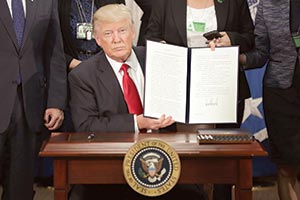Senior Reporter
Reopening Border Trade Deals Sparks Concern in Freight Sector

This story appears in the Feb. 13 print edition of Transport Topics.
Freight sector executives in recent earnings updates and appearances on Capitol Hill stressed that seamless trade agreements are a value for growth and productivity, a reminder to the Trump administration and a Republican-led Congress likely to revisit trade deals with Mexico and other countries.
The Trump administration has floated the possibility of imposing a 20% tax on Mexican imports and has been critical of the North American Free Trade Agreement.
“In spite of the headlines, and there’s been quite a few, President Trump is really not against trade agreements,” UPS Inc. Chairman and CEO David Abney said during an earnings conference call Jan. 31. “Now, he’s made it very clear he wants trade agreements to be fair from a U.S. perspective, and he also has made it clear that, versus multilateral agreements, he’s much more focused on bilateral agreements.
“We think that global trade is still going to continue to grow, and we’re prepared to make those adjustments,” Abney added, “and if something does happen, where trade drops in particular areas of the world, then we will make those adjustments, too.”
FedEx Corp. Chairman and CEO Fred Smith shared a similar message when he testified before a House transportation panel Feb. 1.
“There’s been a lot of conversation in Washington these days about trade. FedEx is ardently in support of expanded trade, not less trade,” Smith said. “We certainly acknowledge the protectionism and mercantilism, particularly of China, but the secret to that is to expand our access to their market, not shut down the trading system that’s made this country so prosperous.”
UPS ranks No. 1 on the Transport Topics Top 100 list of the largest U.S. and Canadian for-hire carriers. FedEx is No. 2.
For Kansas City Southern Railway Co., a major U.S.-Mexico cross-border carrier for inter- modal rail, trade negotiations with the Mexican government are of utmost importance. A spokes- woman told Transport Topics the expectation from company leadership is “there is not likely to be any specific new tariff on goods” entering the country from Mexico.
“Given that the economic stakes of North American trade are so significant and well-understood by both sides, especially for Midwestern agriculture, we are confident that reasonable modification of Nafta is still the most likely outcome,” said Doniele Carlson, assistant vice president of corporate communications and community affairs at Kansas City Southern.
According to American Trucking Associations, the value of goods traveling between the United States and Canada has risen nearly 168% to $712 billion since 1995, helping to support thousands of jobs in the industry. For U.S. trade with Mexico, trucks move 83% of the trade between the countries, making 5.5 million crossings in 2015.
Nearly $1.5 billion of goods, ranging from fruits and vegetables to vehicles and electronics, cross between the United States and Mexico every day, primarily by roads and rails, according to the Department of Commerce. It notes that the majority of avocados and tomatoes consumed in the country come from Mexico.
Bill Sullivan, ATA’s executive vice president of advocacy, said his group would work to support any trade policies that “help grow good-paying American jobs and the trucking industry.”
“Trade and trucking are synonymous, and the increased movement of freight yields more good-paying jobs and growth in American companies,” Sullivan said. “We want to help the administration and Congress build a trade framework that helps grow our economy, including the trucking industry.”
The chatter coming from the Trump White House is about the possibility of imposing a 20% tax on Mexican imports as a way to pay for a wall along the border in hopes of stifling illegal immigration. White House Press Secretary Sean Spicer would later clarify the tax was “one idea through comprehensive tax reform” to pay for such a wall. The president went over the tax idea in discussions with Republican lawmakers, Spicer added.
Trump and the team he has assembled for the Department of Commerce have criticized Nafta, a Clinton-era accord negotiated by Canada, Mexico and the United States.
On Capitol Hill, Speaker Paul Ryan (R-Wis.) suggested Republicans plan to advance a restructuring of business taxes. He also acknowledged Trump potentially will move on to impose a punitive tariff on companies that manufacture goods overseas.
To be sure, the top tax policy writers — House Ways and Means Chairman Kevin Brady (R-Texas) and Senate Finance Chairman Orrin Hatch (R-Utah) — say they plan to proceed on an overseas business reform package.
Anthony Hatch, a senior transportation analyst at ABH Consulting, said he suspects Trump is engaging in preliminary discussions on trade to set the stage for negotiations in the near future.
“We’re still maybe in the time when it’s saber-rattling and part of a negotiating tactic. Perhaps that’s what it is,” Hatch told TT. “My gut tells me that he means what he says, and that that’s unfortunate. But maybe I’m wrong. I’d like to be wrong.”
Staff Reporters Jonathan S. Reiskin and Ari Ashe contributed to this article.




